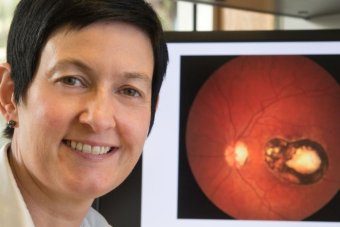The Ebola virus can live in eye fluid 10 weeks after it is no longer detectable in a patient’s blood, Australian research has confirmed.
A study undertaken by researchers from Flinders University in South Australia involved Ebola survivor Dr Ian Crozier, an infectious diseases specialist who contracted the disease while treating patients in Sierra Leone in West Africa last August.
Dr Crozier survived after getting treatment in the United States and was declared free of the virus in his blood, but two months later fluid from his eye tested positive for Ebola.
Flinders ophthalmology researcher Professor Justine Smith, who took part in the study, told 891 ABC Adelaide the discovery of Ebola virus in the clear fluid in the front of the eye, between the lens and the cornea, could have big implications for Ebola survivors and for the medical staff who treat them.
You have mechanisms within your eye that limit inflammation. That means that pathogens such as viruses can lurk in the eye and not be ‘grabbed’ by the immune system, like they would be if they were elsewhere in the body.
Professor Justine Smith
“[There is] the possibility that after people survive Ebola they can develop a very severe inflammation within the eye. We don’t know how many, but it could be as many as half of survivors,” she said.
“When you have a severe inflammation in the eye there are a lot of delicate tissues that can be damaged.”
Professor Smith said that could mean added implications for Ebola survivors, who may develop early cataracts, glaucoma or swelling of the retina.
“The inflammation can have a lot of serious consequences, so it can damage the vision and sometimes irreversibly,” she said.
The researchers are keen to work out why Ebola persists in eye fluid, but already feel confident it does not mean Ebola can be readily passed to other people from survivors of the virus.
“At this early stage we don’t have all the answers but the eye is what we call ‘immune privileged’ … you have mechanisms within your eye that limit inflammation,” Professor Smith explained.
“That means that pathogens such as viruses can lurk in the eye and not be ‘grabbed’ by the immune system, like they would be if they were elsewhere in the body.
“Casual contact is of no risk for patients who have survived Ebola.”
She said for medical workers or others who had recovered from Ebola “there isn’t the risk of passing it on”.
But the researchers worry that in settings such as eye surgery there is a risk of people in the operating room being exposed to the virus.
Professor Smith said the finding might help in development of future treatments for Ebola.
“If you understand how a virus or bacteria is causing an illness then you are one step ahead of it in terms of starting to develop a treatment for it,” she said.
Professor Smith said Ebola survivors needed to be monitored for long-term side effects.
“Certainly these findings will mean the thousands of Ebola survivors in West Africa will need to be monitored for eye disease post-recovery,” she said.
The Flinders study was published in the New England Journal of Medicine.


